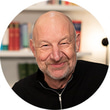“What optometrists do changes lives, saves lives and builds lives”
AOP chief executive, Adam Sampson, shares how playing a supporting role on holiday unexpectedly demonstrated and reminded him of the importance of access to eye care and the role of the optometrist

28 September 2023
I am writing this from a balcony in Jamaica overlooking the Caribbean Sea with a small glass of rum positioned delicately to my right. The sun is setting like it is posing for a photograph and the mosquitos have not yet started about their infernal nightly ritual of feasting on whatever bits of Sampson flesh they can get at. Sigh – it should always be like this…
However, on this trip, these occasional moments of bliss have been relatively rare. While this is formally a holiday, in practice much of the past 10 days have been spent supporting my partner and her elderly father, for whom this is probably his last trip back to his former homeland, to sort out some long overdue family business. There have been meetings with lawyers, endless queuing at bureaucratic counters, and, poignantly, a day spent installing a new headstone on a family grave.
For a white guy from rural Kent like me with no prior links to Jamaica, the last event was a striking experience. In the UK, by and large cemeteries are places for respectful demeanours and hushed whispers. If there is business to be done, it is done in private before the mourners arrive looking solemn, by those paid to do it.
What was particularly interesting to me was to hear, woven into this fabric of narrative, constant references to eyesight
In Jamaica (well, St Thomas Parish at least), traditions are very different. Firstly, the job of digging (in this case restoring) a grave was done by the family, with everyone joining in and doing the clearing and digging, building and cementing. Secondly, instead of hushed whispers we had a sound system blasting from on top of one grave while bottles of rum and Red Stripe were arranged on another. Try doing that in a village cemetery in the Weald of Kent next time you’re passing through.
And of course, next the stories began. As always, there was the bewildering landscape of family relationships to negotiate: tales of births and deaths; love affairs and marriages; desertions and betrayals. But what was particularly interesting to me was to hear, woven into this fabric of narrative, constant references to eyesight – people who had missed out on their education or job opportunities because of their poor vision, or someone who crashed his car because he couldn’t see properly at night, or of the three family members who had gone blind.
The next day, I mentioned this to an expat family member who, given that his job in Canada involves overseeing the integration of healthcare IT systems for the province of Alberta (including, I should note, community optometry) had a fair understanding of these things. Yes, he said, there was a real family sight issue. He himself had been lucky enough to get early access to an optometrist, but he was the exception. In a rural, poor area of a country like Jamaica, many of the family had not had the money or the determination to access the help there was and had struggled on without any professional input until it was too late.
He himself had been lucky enough to get early access to an optometrist, but he was the exception
I know that, for most of you, this is the web and weft of your everyday role. But running into it unexpectedly like this was a reminder of the vital importance of the job that optometrists do. Much of my day job involves focusing on the mechanics of the sector: the training, employment, remuneration, IT support, as so on. I suspect I am not alone in that: the day-to-day detail of life always predominates. But we have to keep a grip on – and celebrate – the underlying moral purpose of optometry. What optometrists do changes lives, saves lives and builds lives. You know it; I know it. We need more people to know it.


Comments (0)
You must be logged in to join the discussion. Log in